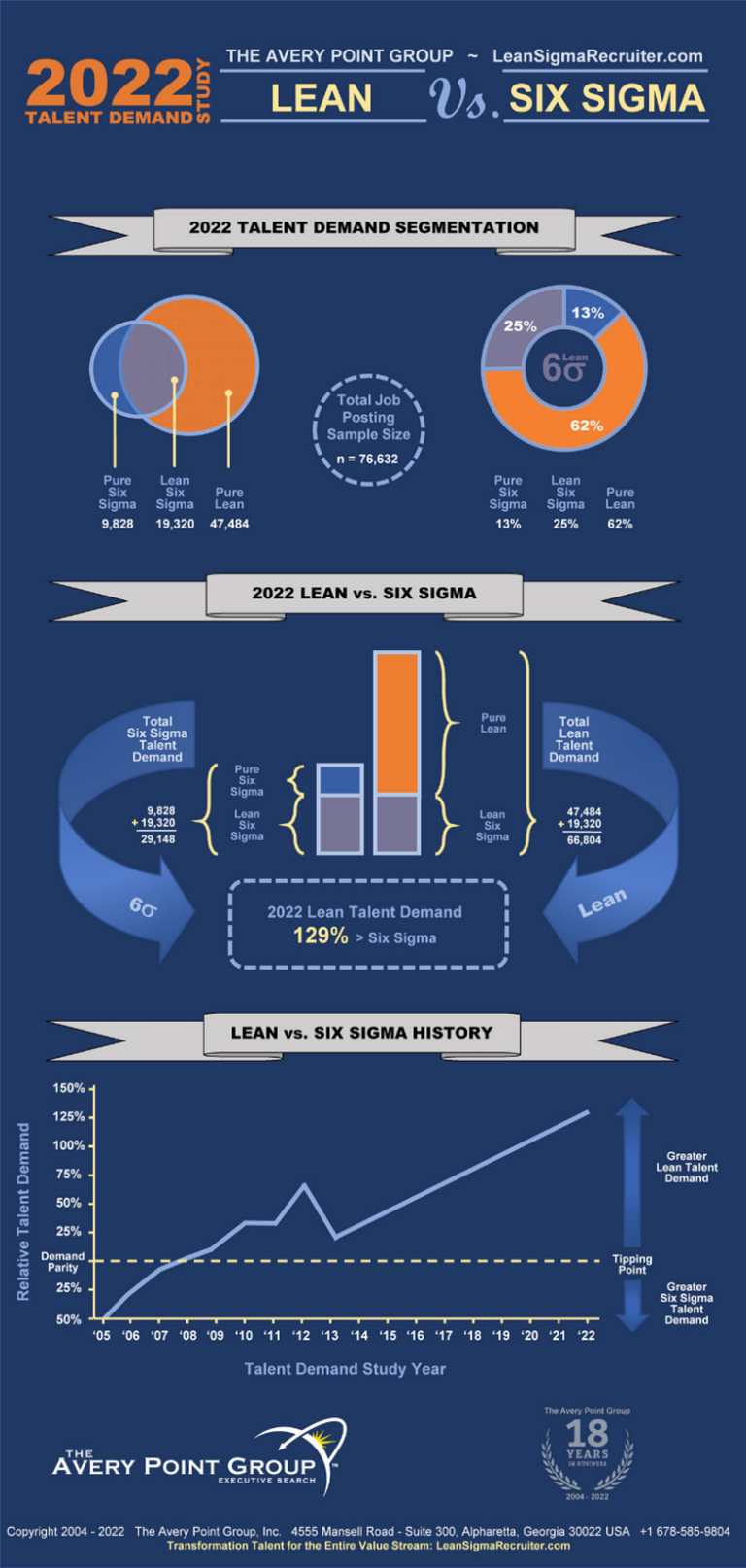Lean Talent Wins Over Six Sigma Skills
Lean Talent Wins Over Six Sigma Skills
By: Jill Jusko
When it comes to lean versus Six Sigma talent demand, lean wins, hands down.
That’s the primary takeaway from a 2022 study by executive search and recruiting firm the Avery Point Group, based on its review of Internet job board postings seeking these two continuous improvement skills.
While more than half of the postings (62%) sought out pure lean skills, just 13% searched for pure Six Sigma talent, with the remaining percentage looking for a mix of the two. That 62% is considerably up from the 41% of job postings seeking pure lean in 2013, the last year in which the Avery Point Group conducted the study. In that same year, the search for pure Six Sigma talent came in at 27%, a comeback of sorts over what had been a record low 20% in the previous year’s study.
It’s all quite a comedown for Six Sigma, which dominated the requested skill set in 2005, the first year in which the study was conducted. Lean took the lead three years later, and never let go. (Article continues below graphic).

What does any of this mean? Why does lean remain so popular, and is the demise of Six Sigma approaching? Tim Noble, managing principal and partner at the Avery Point Group, suggests that the continued appeal of lean talent may be due in part to its practical focus on removing waste and improving flow—particularly in today’s challenging economy—as well as companies’ ongoing efforts to mature their lean initiatives.
And of the suggestion from some quarters that lean hasn’t stood up well to COVID-inspired supply chain issues? “It would be bad to place blame on lean for a once-in-a-century event. I think the focus should be on what organizations can do to make their supply chains more nimble/flexible/responsive to events that fall outside our typical expected events,” he says. “I think that lean can play a role in that effort.”
Meanwhile, Six Sigma is not going away. “Six Sigma still has a very important place in continuous improvement work, where it can be best leveraged to solve complex systemic process problems by targeting process variation, process yield and to gain a better understanding of the input factors that drive a process’s overall performance and capability,” Noble said in the news release accompanying the study.
However, Noble also shared some worrying news for those companies seeking Six Sigma talent. “We are starting to see that some candidates struggle to demonstrate the knowledge needed to fill a client’s key Six Sigma needs when it comes to our technical assessments,” he said. Noble suggested the struggle may be due to lack of on-the-job use, given the growing shift to lean, as well as poor training “from the plethora of Six Sigma training and certification companies.”
He said in many instances Six Sigma training is not being paired with statistical software tools, “so you’re not getting the full power of the methodology.”
One Obvious Change Among Talent Seekers
Among the biggest changes from the early days of the study to today are the types of job roles companies are seeking. In the mid-2000s, Noble said companies were looking for practitioners, such as continuous improvement managers, or lean managers, or Six Sigma leaders. The skill was the role.
Today the desire for such skills is pervasive among many job titles. “Now (companies) are looking for the talent, but in functional roles,” Noble says, citing examples such as a supply chain manager with lean experience, or one who has a green belt or kaizen experience. “So, not specific practitioners, but having the knowledge,” he says.
Ultimately, Noble says lean and Six Sigma isn’t an either-or discussion. “There is a place for both to exist together.”
Source: https://www.industryweek.com/operations/article/21244864/lean-talent-wins-over-six-sigma-skills
